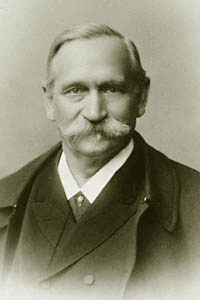Eduard von Rindfleisch
Eduard von Rindfleisch (1836-1908) was a prominent German pathologist known for his significant contributions to the field of medicine, particularly in the study of pathology. Born in Breslau, which was then part of Prussia and is now Wrocław, Poland, Rindfleisch was a key figure in the development of modern pathological practices and theories.
Biography[edit | edit source]
Eduard von Rindfleisch was born on October 5, 1836, in Breslau. He pursued his medical studies at the University of Breslau and later at the University of Bonn, where he developed a keen interest in pathology, the study of diseases. After completing his studies, Rindfleisch worked in various hospitals and universities, dedicating his career to teaching and research in pathology.
Throughout his career, Rindfleisch was known for his meticulous approach to the microscopic study of tissues and his contributions to understanding the cellular basis of diseases. His work laid the groundwork for future research in cellular pathology, a field that seeks to understand the complex processes leading to disease at the cellular level.
Contributions to Pathology[edit | edit source]
Eduard von Rindfleisch's contributions to pathology were numerous and varied. He is perhaps best known for his research on blood vessels and the circulation of blood within tissues, which played a crucial role in understanding various pathological conditions. One of his significant contributions was the elucidation of the process of embolism and thrombosis, conditions that involve the blockage of blood vessels, leading to tissue damage or death.
Rindfleisch also made important contributions to the understanding of inflammation, a fundamental pathological process that occurs in response to injury or infection. His work helped to clarify the cellular and vascular changes that occur during inflammation, contributing to the development of treatments for inflammatory diseases.
Legacy[edit | edit source]
Eduard von Rindfleisch's legacy in the field of pathology is enduring. His dedication to the study of disease at the microscopic level helped to establish pathology as a distinct scientific discipline, integral to the practice of medicine. Rindfleisch's work inspired generations of pathologists and medical researchers, and his teachings and publications continue to be referenced in the study of pathology today.
Rindfleisch was also known for his role as an educator, having trained numerous students who would go on to make significant contributions to medicine and pathology. His ability to convey complex concepts in an understandable manner made him a beloved figure among his students and colleagues.
Selected Works[edit | edit source]
Eduard von Rindfleisch authored several influential texts on pathology, which were widely read and cited in the medical community. His publications covered a range of topics, from the microscopic structure of tissues to the pathological basis of diseases. While a comprehensive list of his works is beyond the scope of this article, his contributions to medical literature have had a lasting impact on the field.
Death and Honors[edit | edit source]
Eduard von Rindfleisch passed away on September 21, 1908. Throughout his life, he received numerous accolades for his contributions to medicine and pathology. His legacy is remembered through the continued relevance of his research and the ongoing respect for his contributions to the field.
Search WikiMD
Ad.Tired of being Overweight? Try W8MD's physician weight loss program.
Semaglutide (Ozempic / Wegovy and Tirzepatide (Mounjaro / Zepbound) available.
Advertise on WikiMD
|
WikiMD's Wellness Encyclopedia |
| Let Food Be Thy Medicine Medicine Thy Food - Hippocrates |
Translate this page: - East Asian
中文,
日本,
한국어,
South Asian
हिन्दी,
தமிழ்,
తెలుగు,
Urdu,
ಕನ್ನಡ,
Southeast Asian
Indonesian,
Vietnamese,
Thai,
မြန်မာဘာသာ,
বাংলা
European
español,
Deutsch,
français,
Greek,
português do Brasil,
polski,
română,
русский,
Nederlands,
norsk,
svenska,
suomi,
Italian
Middle Eastern & African
عربى,
Turkish,
Persian,
Hebrew,
Afrikaans,
isiZulu,
Kiswahili,
Other
Bulgarian,
Hungarian,
Czech,
Swedish,
മലയാളം,
मराठी,
ਪੰਜਾਬੀ,
ગુજરાતી,
Portuguese,
Ukrainian
Medical Disclaimer: WikiMD is not a substitute for professional medical advice. The information on WikiMD is provided as an information resource only, may be incorrect, outdated or misleading, and is not to be used or relied on for any diagnostic or treatment purposes. Please consult your health care provider before making any healthcare decisions or for guidance about a specific medical condition. WikiMD expressly disclaims responsibility, and shall have no liability, for any damages, loss, injury, or liability whatsoever suffered as a result of your reliance on the information contained in this site. By visiting this site you agree to the foregoing terms and conditions, which may from time to time be changed or supplemented by WikiMD. If you do not agree to the foregoing terms and conditions, you should not enter or use this site. See full disclaimer.
Credits:Most images are courtesy of Wikimedia commons, and templates Wikipedia, licensed under CC BY SA or similar.
Contributors: Prab R. Tumpati, MD

